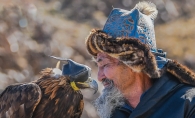Derk Hansen worked as a background designer for a local company that produced decorative wallet accessories in the late 1960s. The business regularly imported European oil paintings, some arriving slightly damaged from shipping. "My boss says, 'Derk, do you paint?’ I told him I didn't, but he sent me to get supplies and fix up the paintings anyways," Hansen recalls.
It led Hansen to discover his natural talent with a paintbrush, enjoying the process of replicating the original artist's style to make seamless repairs. Over the next year, he painted in the lobby at the now-defunct Lavender Inn in Faribault, Minn., where he began exploring different textures and subject matters.
Soon after, painting became Hansen’s full-time profession. He traveled the country and painted at shopping exhibits as he explored America's various landscapes. Of all the scenes, nothing left a stronger impression than the West, which consumed most of his early travels and artwork. "I can't put a finger on it, but I've always been interested in the American West," he says. "Even as a young boy growing up in Germany."
Hansen immigrated to the United States in 1966 with his wife, Vicki, whom he met while performing with his band for an American base. The couple bought their Woodbury home in 1968, witnessing the city's development over decades. Though he's seen positive growth in the area, he's noticed the loss of small barns that have been torn down for development or fallen apart due to age. It's a local historical loss that Hansen feels strongly. "I see these old barns as yesterday's dreams," he says. "The amount of labor and craftsmanship that went into them is amazing, yet now they are diminishing."
In an effort to preserve the remaining structures, Hansen recently began painting local wooden barns that have withstood development. He also travels to photograph other barns across the country.
Hansen's devotion to art has given him diverse, colorful adventures over his longstanding career. He's explored the Alaskan wilderness collecting video footage, participated in a cattle drive from Texas to Montana and sketched sea turtles underwater while scuba diving in Hawaii. Of all his experiences, one sticks out in his memory: videotaping a safari in Zimbabwe during the 1980s. While shooting the documentary, the production group was driven through the landscapes by a local young man. Going through the rough muddy terrain, the driver lost his shoes which seemed impossible to find in the darkness.
"The next morning, I see the young man at breakfast and he has his shoes back. He went out there in the middle of the night and searched through the mud for them," Hansen says.
His exposure to the underdeveloped country where residents lived in mud huts and had few possessions opened Hansen’s eyes to the luxuries he took for granted back home. He was inspired to take hundreds of slides during the trip.
Even with the vibrant career Hansen has experienced, his daily interests remain consistent. He enjoys playing guitar in his country trio, Horse Feathers, studying possible subjects and working in his studio. "I'm very lucky to be doing this," Hansen says. "I look forward to every coming day to paint."
For more information on Derk Hansen’s artwork and his Saddle Tramp Studio, go to the website here.









